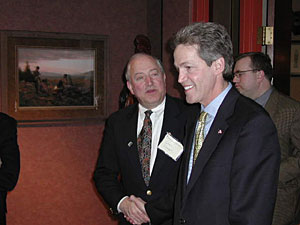|
Audio
Photos
Resources
Respond to this story
|
Coleman outlines agriculture effort
November 20, 2002
Sen.-elect Norm Coleman gave his first policy speech since the election on Tuesday night. The topic was agriculture. Coleman offered few specifics but received a standing ovation from members of the Minnesota Agri-Growth Council.
St. Paul, Minn. — The Council represents some 200 agriculture-related groups and businesses, including commodity groups such as corn and soybean growers and food processors such as Cargill and Land O' Lakes.
Coleman told the group that he's asked Senate Majority Leader Trent Lott for a seat on the Senate Agriculture Committee, because agriculture is an important Minnesota industry.
"The problem with the Senate is when you come in, it is a seniority-based system, and I'm at the bottom of the political food chain right now, in the United States Senate. On the other hand, I hope that the leader understands that, one, he's the leader, and my election had something to do with that," Coleman said.
Coleman said he'd work hard for Minnesota farm interests and would try to advance them by sitting down at the table and working for a change in the partisan tone of Washington.
It was a theme he emphasized in his campaign.
But he said he'd continue to oppose the president on the issue of oil drilling in the Alaska National Wildlife Refuge, or ANWAR
He said, instead, he favors faster development of Minnesota grown renewable fuels such as ethanol.
"I parted with the president on ANWAR not because I'm against getting rid of dependency on foreign oil, I am. But I think our oil fields are right here," Coleman said. "I don't want to release the pressure on renewables. I think we need maximum pressure to say that we have to develop this resource. We can't wait seven years, which is what it would take to get a drop of oil out of ANWAR, so we're going to to do that."
Coleman emphasized his support for Minnesota's livestock industry and called for environmental regulations to be based on "sound science."
"Again, that's a cost. And I believe, firmly believe, that farmers are the original conservationists; that people who live on the land, pass it on for generations, have a stake in conservation and in making sure you can live and the community isn't hurt," he said.
He also called for modernization of the lock-and-dam system on the Mississippi.
Farm groups, such as the corn growers, want the lock-and-dam system expanded so grain exports can move more easily down the river to export markets abroad. Many environmental groups oppose the expansion.
Minnesota Agri-Growth Council President Bob Moraczewski said it was "very appropriate" that Coleman expressed a willingness to work for Minnesota agriculture.
"He didn't make promises of what he could and couldn't do, but he said he would come to the table, make his arguments, work with us, and work to solve the problems of this important industry in the state," Moraczewski said. Moraczewski said he was most impressed by Coleman's support for fewer government regulations for farmers and by Coleman's stand on renewable fuels. He added that he was also pleased that a senator who grew up in Brooklyn would want a seat on the Senate Agriculture Committee.
|
News Headlines
|
Related Subjects
|

